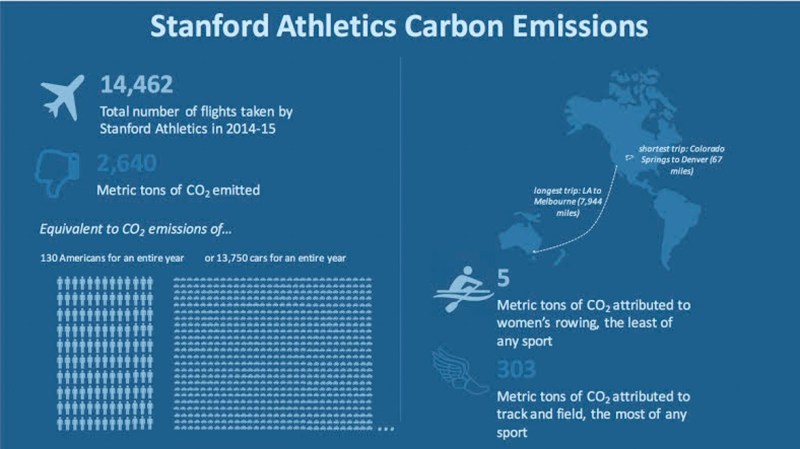Stanford’s varsity athletics program will become carbon-neutral in air travel with the student-initiated program, Stanford Carbon Offsets to Reduce Emissions (SCORE). The program works with carbon offset company 3degrees to invest money into a landfill methane recycling project. Energy produced from the landfill methane will then save emissions equivalent to the annual emissions from the Athletics Department’s flights.
The project’s partners include clubs Students for a Sustainable Stanford (SSS) as well as Stanford Students Environmental Consulting (SSEC), with additional support from the Athletics Department, the Office of Sustainability and the School of Earth, Energy & Environmental Science. Financial support from the School, SSS, Athletics and the TomKat Ranch Educational Foundation will fund the project, providing $3,062 total to cover all 36 varsity sports teams over the next year.
While all of these groups have supported the project, the director of student-athlete leadership and development, Kristen Azevedo, credits varsity track and cross country runner Emma Fisher ’17 with taking the lead.
“While we are really trying to create inroads for student athletes to become involved in these types of initiatives … this is 100 percent student driven,” Azevedo said. “Certainly there needs to be support from administration, but my hat is off to Emma and her team.”
Fisher, who is also an active member of SSS, began researching the potential to offset plane flights last year. As an Earth Systems major and environmentalist, Fisher felt conflicted about her frequent flights across the country to compete in collegiate athletics.
According to the SCORE website, student-athletes at Stanford took a total of 14,000 flights to competitions in 2015. This meant emitting 2,600 metric tons of carbon dioxide, which would require 700,000 new trees to absorb this amount from the atmosphere.
“My personal carbon footprint has exploded since I got [to college], both from athletic flights and visiting home,” Fisher said. “Obviously, teams are going to keep competing and have to travel, but this was a way to make myself feel okay with it.”
After some preliminary research by Fisher — mostly looking into whether or not offsets were valid environmental options or just a positive public relations move for airline companies — SSEC got on board with more in-depth research this fall.
According to Ashley Hammerbacher ’16, co-president of SSEC, the team considered a range of options, from funding renewable energy research to lowering the number of carbon emissions permits in the California cap and trade market. The methane capture and reuse project ended up being the most affordable, in part due to a deal arranged with a Stanford alum at 3degrees.
“We presented a suite of options to the Athletics Department, and they were really excited by landfill methane gas because we could afford to offset all the teams,” Hammerbacher said. “[Investing in an energy project] also helps to make offsets something more understandable and impactful for students and alumni.”
Fisher also emphasized that in addition to the convenient price of landfill methane gas projects, the SCORE team wanted to choose an offset that would provide additional environmental justice benefits. The additional criteria in offset selection included having a third-party verification system and a U.S.-based project.
Because the funding was secured only for the first year via grants, this year’s offsets are being treated as a pilot program. According to Hammerbacher, this year’s offsets will only cover the emissions of in-season travel. In the future, SCORE would like to cover off-season travel as well.
“Our senior staff [in the Athletics Department] is completely open to the idea of expanding the travel offset program, but we want to see how it goes this first year,” Azevedos said.
Correction: A previous version of this article stated that the primary portion of funding came from TomKat Ranch. Although TomKat Ranch gave the first round of funding, the largest portion ended up coming from the School of Earth, Energy & Environmental Sciences. Further, although it was reported that Stanford was the first university to have a carbon-neutral Athletics Department, Colorado and Florida have also taken offset measures. The Daily regrets these errors.
Contact Ada Statler-Throckmorton at adastat ‘at’ stanford.edu.
